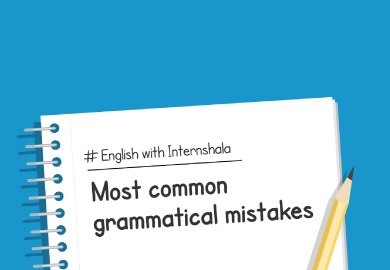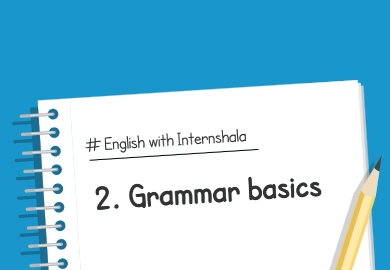Most commonly misused words
In this article of English with Internshala series, we’ll focus on the most commonly misused words in day to day conversations in the English language. Here’s a comprehensive list of some of such common words which are either spelled incorrectly or are used in a wrong manner. Sometimes, the confusion arises as the words are either spelled in a similar fashion or are pronounced similarly. However, before you start reading the list, take this quick test to test your vocabulary knowledge and see where you stand.
1. Accept vs Except:
Accept means to receive something willingly. Except, on the other hand, signifies exclusion.
Examples:
He gladly accepted the offer letter.
Except for Akshat, all other applicants cleared the interview.
The company was accepting applications from all branches of engineering except mechanical.
2. Adapt vs. Adopt vs. Adept:
Adapt is a verb which refers to changing for a new thing/place/environment whereas the verb adopt means to start using something or to legally take something as your own. The adjective adept, on the other hand, means being proficient at doing something.
Examples:
Coming from a small village, he adapted to the college life pretty soon.
The company adopted a new leave policy after regular complaints from the employees.
He’s adept at analysing big data problems without any errors.
3. Advise vs. Advice:
Advice refers to a proposal for an appropriate course of action whereas advise refers to the act of giving an advice.
Examples:
I need some advice for planning a trip to Goa.
The doctor advised him to take complete bed rest.
4. Adverse vs. Averse:
Adverse is used as an adjective to refer to unfavourable, difficult or hostile conditions. Averse means having a strong feeling of opposition or distaste towards something or someone.
Examples:
Despite facing adverse conditions in her village, she continued her struggle and secured top rank in 12th class CBSE exams.
She’s averse to people who think parents shouldn’t provide education to girls.
5. Affect vs. Effect:
The verb affect means to influence something, and the noun effect means the result of. When you affect something, it produces an effect. Affect is also used in another less common way which means to pretend something or to put on a false show.
Examples:
Irregularity in attending lectures affected his final grades.
The effect of his low attendance was clearly visible when he got the final grades.
The actor affected a sense of concern for the poor through his NGO.
6. Altar vs. Alter:
An altar refers to a sacred table in a church. When you want to make a change in something, you alter it.
Examples:
Rachel left Barry standing at the altar and came to Central Perk.
I’m not getting the results. I need to alter the design of my experiments.
7. Compliment vs. Complement:
A compliment is a flattering remark you give to someone; when two things go well together, they complement (complete) each other. Complimentary also refers to something which is given free (as a gift) usually with a product/service.
Examples:
The boss complimented the new intern for his punctuality.
According to him, Parle-G biscuits complement tea in every season.
The hotel provides complimentary breakfast to all the guests.
8. Desert vs. Dessert:
A desert is a barren or uninhabited place whereas a dessert is the last course of a meal, usually sweet.
Examples:
Rajasthan is known for its splendid deserts which attract a lot of tourists during winter.
Apart from its delicious starters, Barbeque Nation is also known for serving a variety of desserts.
9. Farther vs. Further:
Farther is used to refer to the physical distance whereas further is used to denote the degree or extent of something.
Examples:
I’ve covered 8 kms already. I can’t run any farther.
This topic is over. I don’t have anything further to say.
10. Lie vs Lay:
We all are comfortable with the lie that means untruth. But, lie also means to recline. Lay means to set or put something down; you need an object to lay. It’s even more confusing in the past tense as the past form of lie is lay while that of lay is laid!
Examples:
I need to lie down. I’m just too tired after completing the trek.
I lay the resume on the table and wait for the arrival of the interviewer.
11. Lose vs. Loose vs. Loss:
Lose refers to the act of failing to win or of misplacing something. The word loose normally means the opposite of tight or tighten. Loss is the noun form which refers to losing something or someone.
Examples:
He can’t afford to lose this job as he still has to repay his education loan.
This knot is loose. Be careful.
During the recession, most businesses incurred a substantial loss.
12. Principal vs. Principle:
A principal normally means something really important; it’s also used to refer to the head of school. A principle, meanwhile, denotes a fundamental belief or rule that one follows.
Examples:
The principal announced that the school will reopen on 15th July.
He’s a man of principles. He won’t cheat in the exams.
13. Stationary vs. Stationery:
The word stationary signifies that something is not moving. Stationery, on the other hand, refers to the set of writing and other office materials.
Examples:
The car collided with a stationary vehicle.
I tend to misplace office stationery no matter how hard I try.
14. Weather vs. Whether:
Weather refers to the climate or atmospheric conditions. When you need to provide two alternatives or a sense of confusion, whether is used.
Examples:
Bangalore is known for having a perfect weather all through the year.
I’m not sure whether I’ll be able to visit Bangalore this weekend.
Another common mistake which people make is spelling the words wrong. Some most glaring examples of this kind are: definately (instead of definitely), calender (instead of calendar), wierd (instead of weird), alot (instead of a lot), writting (instead of writing), pronounciation (instead of pronunciation) etc.
We hope this was helpful, and you have a better understanding of these confusing words now. It’s time for some fun activity; do an interesting assignment by clicking on the next button below. To go back to the earlier article, click on the previous button.
PS – Do tell us in comments what do you think of English with Internshala initiative and how we can make it more useful for you.





